40 start with S start with S
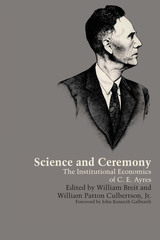
Clarence Edwin Ayres was the leading American institutionalist economist in the post–World War II era. His innovative theories concerning the causes and significance of technological change provided the philosophical framework for that school of economics called institutionalism. In his recognition that the critical economic issues of the future would be the realization of the full economic potential of industrial society and the development of the third world, he was at least twenty years ahead of his time. In addition, Ayres's influence as an economics teacher at the University of Texas at Austin went well beyond the discipline of economics to students of anthropology, psychology, philosophy, education, and even music and art.
This book constitutes the first major appraisal of the work and influence of C. E. Ayres. The essays are written from a transatlantic as well as a national viewpoint and do not evince anyone ideological bias. As John Kenneth Galbraith says in his Foreword, the essays are not meant as a monument to Ayres; instead, they critique what he thought and did, showing "his range of interests, his diligence, his originality of mind and method."
Contributions to the volume are "Clarence Edwin Ayres: An Intellectual's Portrait" by editors William Breit and William Patton Culbertson, Jr.; "Clarence Ayres's Place in the History of American Economics: An Interim Assessment" by A. W. Coats; "C. E. Ayres on the Industrial Revolution" by R. M. Hartwell; "Clarence Ayres and the Roots of Economic Progress" by S. Herbert Frankel; "Technology and the Price System" by W. W. Rostow; "Limits to Growth: Biospheric or Institutional?" by Joseph J. Spengler; "Science's Feet of Clay" by Gordon Tullock; "Ayres's Views on Moral Relativism" by Alfred F. Chalk; "Methods and Morals in Economics: The Ayres-Knight Discussion" by James M. Buchanan; " Clarence Ayres's Economics and Sociology" by Talcott Parsons; and "Clarence E. Ayres as a University Teacher" by Marion J. Levy, Jr.
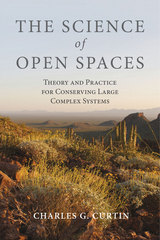
The Science of Open Spaces turns conventional conservation paradigms on their heads, proposing that in thinking about complex natural systems, whether the arid spaces of the southwestern United States or open seas shared by multiple nations, we must go back to "first principles"--those fundamental physical laws of the universe--and build innovative conservation from the ground up based on theory and backed up by practical experience. Curtin walks us through such foundational science concepts as thermodynamics, ecology, sociology, and resilience theory, applying them to real-world examples from years he has spent designing large-scale, place-based collaborative research programs in the United States and around the world.
Compelling for not only theorists and students, but also practitioners, agency personnel, and lay readers, this book offers a thoughtful and radical departure from business-as-usual management of Earth's dwindling wide-open spaces.

Martin McGuire has written for the specialist and the concerned layman a highly original and valuable contribution to our understanding of the arms race, based upon economic theory in general and the theory of economic duopoly in particular. He calls attention to the fact that when two world powers face each other with massive allocations of resources for arms, and when each regards the other as the major, if not the sole, threat to its own security, the question of accurate information about the strength and intentions of the adversary arises for each side in many and various ways. As a result, this study is a pioneering, analytic effort to approach the value of keeping secrets from or of obtaining information about an enemy.
The author is concerned with such questions as: what is the loss in being only 50 percent confident rather than certain that the adversary doesn’t have more X missiles or missiles of yield W megatons or of accuracy C thousand feet? Should one insist on being 95 percent sure when bargaining for arms control? How can a side compensate for its uncertainty most efficiently? An understanding of these problems can not only increase our security; it may help as well to contain or control the entire two-sided race.
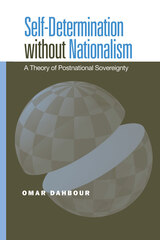
How do groups—be they religious or ethnic—achieve sovereignty in a postnationalist world? In Self-Determination without Nationalism, noted philosopher Omar Dahbour insists that the existing ethics of international relations, dominated by the rival notions of liberal nationalism and political cosmopolitanism, no longer suffice.
Dahbour notes that political communities are an ethically desirable and historically inevitable feature of collective life. The ethical principles that govern them, however—especially self-determination and sovereignty—require reformulation in light of globalization and the economic and environmental challenges of the twenty-first century.
Arguing that nation-states violate the principle of self-determination, Dahbour then develops a detailed new theory of self-determination that he calls "ecosovereignty.” Ecosovereignty defines political community in a way that can protect and further the rights of indigenous peoples as well as the needs of ecological regions for a sustainable form of development and security from environmental destruction.
In the series Global Ethics and Politics, edited by Carol Gould.

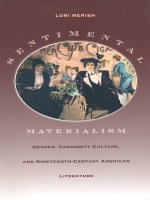
The phenomenon of female consumption was capitalism’s complement to male production: It created what Merish calls the “Other Protestant Ethic,”a feminine and sentimental counterpart to Max Weber’s ethic of hard work, economic rationality, and self-control. In addition, driven by the culture’s effort to civilize the “cannibalistic” practices of ethnic, class, and national otherness, appropriate female consumerism, marked by taste and refinement, identified certain women and their families as proper citizens of the United States. The public nature of consumption, however, had curiously conflicting effects: While the achievement of cultured material circumstances facilitated women’s civic agency, it also reinforced stereotypes of domestic womanhood.
Sentimental Materialism’s inquiry into middle-class consumption and accompanying ideals of womanhood will appeal to readers in a variety of disciplines, including American studies, cultural studies, feminist theory, and cultural history.


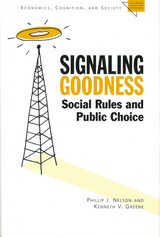
Phillip Nelson and Kenneth Greene are Professors of Economics in the Department of Economics at the State University of New York, Binghamton.

Contributors. Max Cavitch, Brian Connolly, Matthew Crow, John J. Garcia, Christopher Looby, Michael Meranze, Mark J. Miller, Justine S. Murison, Britt Rusert, Ana Schwartz, Joan W. Scott, Jordan Alexander Stein


How do smokers evaluate evidence that smoking harms health? Some evidence suggests that smokers overestimate health risks from smoking. This book challenges this conclusion. The authors find that smokers tend to be overly optimistic about their longevity and future health if they quit later in life.
Older adults' decisions to quit smoking require personal experience with the serious health impacts associated with smoking. Smokers over fifty revise their risk perceptions only after experiencing a major health shock--such as a heart attack. But less serious symptoms, such as shortness of breath, do not cause changes in perceptions. Waiting for such a jolt to occur is imprudent.
The authors show that well-crafted messages about how smoking affects quality of life can greatly affect current perceptions of smoking risks. If smokers are informed of long-term consequences of a disease, and if they are told that quitting can indeed come too late, they are able to evaluate the risks of smoking more accurately, and act accordingly.

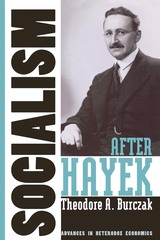
Burczak's version of market socialism is one in which privately owned firms are run democratically by workers, governments engage in ongoing redistribution of wealth to support human development, and markets are otherwise unregulated. Burczak poses this model of "free market socialism" against other models of socialism, especially those developed by John Roemer, Michael Albert, and Robin Hahnel.
"Burczakian socialism = (Hayek + Nussbaum + Sen + Ackerman + Resnick and Wolff) = Ellerman = legal-economic democracy. Brilliant! Burczak takes Hayek, his critics, and other social theorists and produces the foundations of a legal-economic order in which the concerns of most current thinkers are provided for. It is a deep, sustained, and brilliant achievement."
—Warren J. Samuels, Professor Emeritus, Economics Department, Michigan State University; former President of the History of Economics Society and the Association for Social Economics; coeditor of the Journal of Income Distribution; and author of over 40 books
"Theodore A. Burczak's Socialism after Hayek is a thoroughly researched and thoughtful examination not only of the ideological debate that framed the twentieth century, but of Hayek's intellectual framework. Burczak hopes for an economic framework that is both humanistic in its approach and humanitarian in its concern while being grounded in good reasons. The book should be on the reading list of every comparative political economist and in particular anyone who wants to take Hayek seriously, including those who would like to push Hayek's classical liberal politics toward the left in the twenty-first century. Burczak has made an outstanding contribution to the fields of political and economic thought and to Hayek studies in particular."
—Peter J. Boettke, Professor and Director of Graduate Studies, Department of Economics, George Mason University, Fairfax
"An advance well beyond the great 'socialist calculation debate.' Socialism after Hayek is both novel and challenging to contemporary Hayekian scholars. Burczak is the only scholar working in the post-Marxist tradition that thoroughly understands and appreciates the Hayekian critique of socialism. He is on his way to answering many of our long-held objections."
—Dave Prychitko, Department of Economics, Northern Michigan University
"One does not have to agree with all of Burczak's arguments to accept that he has developed a bold, creative and challenging response to the powerful Hayekian critique of socialism. Burczak wisely rejects the agoraphobia—literally the fear of markets—of many socialists, and focuses instead on the socialist goal of the abolition of exploitation. If this important book is read by both socialists and Hayekians, then there is a chance that debates on the viability of socialism may avoid some past pitfalls."
"Provocative and expansive. An excellent book that deals in depth with the relevant literature, incorporating it into a new analysis of the question of socialism. . . . The scholarship is superior: Burczak integrates the works of Hayek and Marx to develop a new theory of justice and to provide a new way to think through the problems of a socialist economy."
—Stephen Cullenberg, Department of Economics, University of California, Riverside
"A brilliant, fair-minded approach to Marx, Hayek, Sen, and Nussbaum yields a needed socialist vision for the twenty-first century."
—Stephen Resnick, Department of Economics, University of Massachusetts
Theodore A. Burczak is Associate Professor of Economics at Denison University.
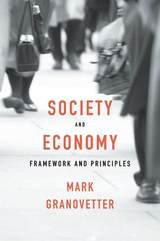
Society and Economy—a work of exceptional ambition by the founder of modern economic sociology—is the first full account of Mark Granovetter’s ideas about the diverse ways in which society and economy are intertwined.
The economy is not a sphere separate from other human activities, Granovetter writes. It is deeply embedded in social relations and subject to the same emotions, ideas, and constraints as religion, science, politics, or law. While some actions can be understood in traditional economic terms as people working rationally toward well-defined ends, much human behavior is harder to fit into that simple framework. Actors sometimes follow social norms with a passionate faith in their appropriateness, and at other times they conform without conscious thought. They also trust others when there is no obvious reason to do so. The power individuals wield over one another can have a major impact on economic outcomes, even when that power arises from noneconomic sources.
Although people depend on social norms, culture, trust, and power to solve problems, the guidance these offer is often murky and complicated. Granovetter explores how problem solvers improvise to assemble pragmatic solutions from this multitude of principles. He draws throughout on arguments from psychology, social network studies, and long-term historical and political analysis and suggests ways to maneuver back and forth among these approaches. Underlying Granovetter’s arguments is an attempt to move beyond such simple dualisms as agency/structure to a more complex and subtle appreciation of the nuances and dynamics that drive social and economic life.

Sztompka connects the interpretations of such collective activity to a wider grasp of the nature of social action. The result is a comprehensive and original theory of social change which focuses on the self-transforming influence on society of its members' striving for freedom, autonomy, and self-fulfillment. He develops his theory by means of a general concept of "social becoming," the roots of which he traces to the early romantic and humanist work of Karl Marx and his followers and to two influential sociological schools of today, the theory of agency and historical sociology.
Sztompka situates his theory midway between the rigid determinism of social totalities and the unbridled voluntarism of free individuals. Social change, he demonstrates, can be understood neither as the outcome of individual actions taken alone nor as structurally determined actions. Instead, he confers upon social organizations and movements a "self-transcending" quality: they express human agency yet, by virtue of their active character, are quite often able to achieve unpredictable outcomes.
Throughout his analysis of social movements and revolutions in history, Sztompka emphasizes the dynamics of spontaneous social change generated from below—a theoretical testimony to the rapid and fundamental social change in Eastern Europe in recent history. Against the fashions of postmodernist malaise, boredom, and disenchantment, his theory of social becoming expresses the possibility of emancipation, of change leading to positive gains. His work registers a belief in progress, not inevitably gained, but its attainment fully dependent upon the creativity and optimism of an active citizenry.
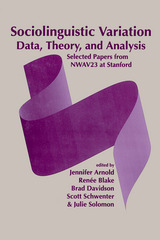
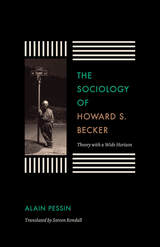
French fame has brought French analysis, including The Sociology of Howard S. Becker, written by Alain Pessin and translated into English by Steven Rendall. The book is an exploration of Becker’s major works as expressions of the freedom of possibility within a world of collaborators. Pessin reads Becker’s work as descriptions and ideas that show how society can embody the possibilities of change, of doing things differently, of taking advantage of opportunities for free action. The book is itself a kind of collaboration—Pessin and Becker in dialogue. The Sociology of Howard S. Becker is a meeting of two cultures via two great sociological minds in conversation.





Contributors: Molly M. Breckling, William A. Everett, Kate Galloway, Sara Haefeli, Eric Hung, Stephanie Jensen-Moulton, Mark Katz, Nathan A. Langfitt, Matteo Magarotto, Mary Natvig, Frederick A. Peterbark, Laura Moore Pruett, Colleen Renihan, Amanda Christina Soto, John Spilker, Reba A. Wissner, and Trudi Wright

"A variety of approaches are brought to bear on fascinating repertoire, but with the underlying aim of better understanding some brilliant music. There’s nothing more exciting in music writing than something which entices you to listen to what’s familiar to you in a new way, and this collection brings such excitement in abundance."
---Allan Moore, author of Jethro Tull: Aqualung and Rock: The Primary Text
"These essays bring together a remarkable range of tools and perspectives to such diverse topics and contexts as the behind-the-scenes collaborations of composers, performers, arrangers, producers and engineers; pop culture; narratology; and race, politics and gender. The reader continuously benefits from a complementary lineup of sensitive ears that discover novelty in the familiar, exposing the heart of many rock and pop classics through imaginative and authoritative prose."
---Walter Everett, author of The Foundations of Rock and The Beatles as Musicians
The nine essays in Sounding Out Pop work together to map the myriad styles and genres of the pop-rock universe through detailed case studies that confront the music from a variety of engaging, thought-provoking perspectives---from historical to music-analytic, aesthetic to ethnographic, with several authors drawing liberally from ideas in other disciplines. The range of bands and artists covered is as vast and varied as the more than fifty-year history of pop and rock music, from the Coasters and Roy Orbison to Marvin Gaye, Bob Dylan, Radiohead, Beck, Genesis, Tori Amos, and the Police. Together these diverse essays cover a broad spectrum of studies ideally suited for classroom use and for other readers interested in gaining a deeper knowledge of the way popular music works.
Mark Spicer is Associate Professor and Director of Undergraduate Studies in Music at Hunter College and the Graduate Center, City University of New York. His writings have appeared in Contemporary Music Review, Gamut, Music Theory Online, twentieth-century music, and other scholarly journals and essay collections.
John Covach is Professor of Music at the University of Rochester and Professor of Theory at the Eastman School of Music. He is the author of the college textbook What's That Sound? An Introduction to Rock and Its History and the coeditor of Understanding Rock, American Rock and the Classical Music Tradition, and Traditions, Institutions, and American Popular Music.
Cover art credit: © iStockphoto.com/Aleksandar Dickov
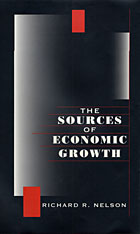
Technological advance is the key driving force behind economic growth, argues Richard Nelson. Investments in physical and human capital contribute to growth largely as handmaidens to technological advance. Technological advance needs to be understood as an evolutionary process, depending much more on ex post selection and learning than on ex ante calculation. That is why it proceeds much more rapidly under conditions of competition than under monopoly or oligopoly.
Nelson also argues that an adequate theory of economic growth must incorporate institutional change explicitly. Drawing on a deep knowledge of economic and technological history as well as the tools of economic analysis, Nelson exposes the intimate connections among government policies, science-based universities, and the growth of technology. He compares national innovation systems, and explores both the rise of the United States as the world’s premier technological power during the first two-thirds of the twentieth century and the diminishing of that lead as other countries have largely caught up.
Lucid, wide-ranging, and accessible, the book examines the secrets of economic growth and why the U.S. economy has been anemic since the early 1970s.
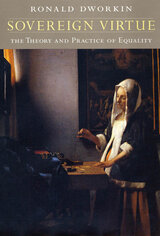
Equality is the endangered species of political ideals. Even left-of-center politicians reject equality as an ideal: government must combat poverty, they say, but need not strive that its citizens be equal in any dimension. In his new book Ronald Dworkin insists, to the contrary, that equality is the indispensable virtue of democratic sovereignty. A legitimate government must treat all its citizens as equals, that is, with equal respect and concern, and, since the economic distribution that any society achieves is mainly the consequence of its system of law and policy, that requirement imposes serious egalitarian constraints on that distribution.
What distribution of a nation's wealth is demanded by equal concern for all? Dworkin draws upon two fundamental humanist principles--first, it is of equal objective importance that all human lives flourish, and second, each person is responsible for defining and achieving the flourishing of his or her own life--to ground his well-known thesis that true equality means equality in the value of the resources that each person commands, not in the success he or she achieves. Equality, freedom, and individual responsibility are therefore not in conflict, but flow from and into one another as facets of the same humanist conception of life and politics. Since no abstract political theory can be understood except in the context of actual and complex political issues, Dworkin develops his thesis by applying it to heated contemporary controversies about the distribution of health care, unemployment benefits, campaign finance reform, affirmative action, assisted suicide, and genetic engineering.

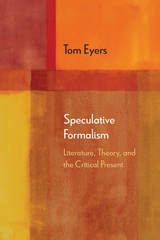
Through a combination of philosophical reflection and close rhetorical readings, Eyers explores the possibilities and limits of deconstructive approaches to the literary, the impact of the “digital humanities” on theory, and the prospects for a formalist approach to “world literature.” The book includes sustained close readings of Baudelaire, Mallarmé, Yeats, and Wallace Stevens, as well as Alain Badiou, Paul de Man, and Fredric Jameson.
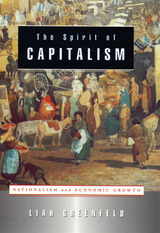
The Spirit of Capitalism answers a fundamental question of economics, a question neither economists nor economic historians have been able to answer: what are the reasons (rather than just the conditions) for sustained economic growth? Taking her title from Max Weber's famous study on the same subject, Liah Greenfeld focuses on the problem of motivation behind the epochal change in behavior, which from the sixteenth century on has reoriented one economy after another from subsistence to profit, transforming the nature of economic activity. A detailed analysis of the development of economic consciousness in England, the Netherlands, France, Germany, Japan, and the United States allows her to argue that the motivation, or "spirit," behind the modern, growth-oriented economy was not the liberation of the "rational economic actor," but rather nationalism. Nationalism committed masses of people to an endless race for national prestige and thus brought into being the phenomenon of economic competitiveness.
Nowhere has economic activity been further removed from the rational calculation of costs than in the United States, where the economy has come to be perceived as the end-all of political life and the determinant of all social progress. American "economic civilization" spurs the nation on to ever-greater economic achievement. But it turns Americans into workaholics, unsure of the purpose of their pursuits, and leads American statesmen to exaggerate the weight of economic concerns in foreign policy, often to the detriment of American political influence and the confusion of the rest of the world.

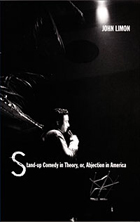
Limon begins with stand-up comics in the 1950s and 1960s—Lenny Bruce, Carl Reiner, Mel Brooks, Mike Nichols, Elaine May—when the norm of the profession was the Jewish, male, heterosexual comedian. He then moves toward the present with analyses of David Letterman, Richard Pryor, Ellen DeGeneres, and Paula Poundstone. Limon incorporates feminist, race, and queer theories to argue that the “comedification” of America—stand-up comedy’s escape from its narrow origins—involves the repossession by black, female, queer, and Protestant comedians of what was black, female, queer, yet suburbanizing in Jewish, male, heterosexual comedy. Limon’s formal definition of stand-up as abject art thus hinges on his claim that the great American comedians of the 1950s and 1960s located their comedy at the place (which would have been conceived in 1960 as a location between New York City or Chicago and their suburbs) where body is thrown off for the mind and materiality is thrown off for abstraction—at the place, that is, where American abjection has always found its home.

Popkin begins by discussing the British origins of statutory interpretation in this country. He then maps the evolving conceptions of the judicial role in the United States from Revolutionary times through the twentieth century before presenting his “ordinary judging” theory—one that asks the judge to use modest judicial discretion to assist the legislature in implementing good government. Claiming that theory cannot account for everything a judge does when determining statutory meaning or writing an opinion, Popkin shows how judges who strive to be conscientious in interpreting the law are often hampered by the lack of both a framework in which to fit their approach and a well-understood common vocabulary to explain what they do. Statutes in Court fills that gap.
This work will be valuable to anyone concerned about the judicial role in the interpretation of laws—from judiciary officials and law professors to legal historians and political scientists.


Though commonly thought of as a kind of worldliness at its best and an elitist snobbery at its worst, sophistication, Litvak reminds us, remains tied to its earlier, if forgotten, meaning of "perversion"—a perversion whose avatars are the homosexual and the intellectual. Proceeding with his investigations from a specifically gay academic perspective, Litvak presents thoroughly inventive readings of novels by Austen, Thackeray, and Proust, and of theoretical works by Adorno and Barthes, each text epitomizing sophistication in one of its more familiar modes. Among the issues he explores are the ways in which these texts teach sophistication, the embarrassment that sophistication causes the sophisticated, and how the class politics of sophistication are inseparable from its sexual politics. Helping gay, queer, feminist, and other provocative critics to make the most of their bad publicity, Litvak mindfully celebrates sophistication’s economy of taste and pleasure.
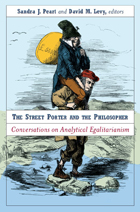
Adam Smith, asserting the common humanity of the street porter and the philosopher, articulated the classical economists' model of social interactions as exchanges among equals. This model had largely fallen out of favor until, recently, a number of scholars in the avant-garde of economic thought rediscovered it and rechristened it "analytical egalitarianism." In this volume, Sandra J. Peart and David M. Levy bring together an impressive array of authors to explore the ramifications of this analytical ideal and to discuss the ways in which an egalitarian theory of individuality can enable economists to reconcile ideas from opposite ends of the political spectrum.
"The analytical egalitarianism project that Peart and Levy have advanced has come to occupy a prominent place in the current agenda of historians of economic thought."
---Ross Emmett, Associate Professor of Economics and Co-Director of the Michigan Center for Innovation and Economic Prosperity, Michigan State University
"These essays and dialogs from the Summer Institute would make Adam Smith, economist and moral philosopher, proud."
---J. Daniel Hammond, Hultquist Family Professor of Economics, Wake Forest University
With essays by:
- James M. Buchanan, Alfred Nobel Memorial Prize in Economic Sciences recipient (1985) and Professor Emeritus, George Mason University and Virginia Polytechnic and State University
- Juan Pablo Couyoumdijian, Universidad del Desearrollo, Chile
- Tyler Cowen, George Mason University
- Eric Crampton, University of Canterbury, New Zealand
- Andrew Farrant, Dickinson College
- Samuel Hollander, Professor Emeritus, University of Toronto
- M. Ali Khan, Johns Hopkins University
- Thomas Leonard, Princeton University
- Deirdre McCloskey, University of Illinois, Chicago
- Leonidas Montes, Dean of School of Government, Universidad Adolfo Ibañez, Chile
- Maria Pia Paganelli, Yeshiva University and New York University
- Warren J. Samuels, Professor Emeritus, Michigan State University
- Eric Schliesser, VENI post-doctoral research fellow, Leiden University, and University of Amsterdam
- Gordon Tullock, George Mason University
Sandra J. Peart is Dean of the Jepson School of Leadership Studies, University of Richmond, Virginia.
David M. Levy is Professor of Economics at George Mason University (GMU) and Research Associate at the Center for Study of Public Choice at GMU.
They are Co-Directors of George Mason University's Summer Institute for the Preservation of the History of Economics.

Many consumers feel powerless in the face of big industry’s interests. And the dominant view of economic regulators (influenced by Mancur Olson’s book The Logic of Collective Action, published in 1965) agrees with them. According to this view, diffuse interests like those of consumers are too difficult to organize and too weak to influence public policy, which is determined by the concentrated interests of industrial-strength players. Gunnar Trumbull makes the case that this view represents a misreading of both the historical record and the core logic of interest representation. Weak interests, he reveals, quite often emerge the victors in policy battles.
Based on a cross-national set of empirical case studies focused on the consumer, retail, credit, pharmaceutical, and agricultural sectors, Strength in Numbers develops an alternative model of interest representation. The central challenge in influencing public policy, Trumbull argues, is not organization but legitimation. How do diffuse consumer groups convince legislators that their aims are more legitimate than industry’s? By forging unlikely alliances among the main actors in the process: activists, industry, and regulators. Trumbull explains how these “legitimacy coalitions” form around narratives that tie their agenda to a broader public interest, such as expanded access to goods or protection against harm. Successful legitimizing tactics explain why industry has been less powerful than is commonly thought in shaping agricultural policy in Europe and pharmaceutical policy in the United States. In both instances, weak interests carried the day.


Meyer devotes the latter part of his book to a sketch-history of nineteenth-century music. He shows explicitly how the beliefs and attitudes of Romanticism influenced the choices of composers from Beethoven to Mahler and into our own time.
"A monumental work. . . . Most authors concede the relation of music to its cultural milieu, but few have probed so deeply in demonstrating this interaction."—Choice
"Probes the foundations of musical research precisely at the joints where theory and history fold into one another."—Kevin Korsyn, Journal of American Musicological Society
"A remarkably rich and multifaceted, yet unified argument. . . . No one else could have brought off this immense project with anything like Meyer's command."—Robert P. Morgan, Music Perception
"Anyone who attempts to deal with Romanticism in scholarly depth must bring to the task not only musical and historical expertise but unquenchable optimism. Because Leonard B. Meyer has those qualities in abundance, he has been able to offer fresh insight into the Romantic concept."—Donal Henahan, New York Times

Human-generated greenhouse gas emissions imperil a global resource: a biosphere capable of supporting life as we know it. What is the fair way to share this scarce resource across present and future generations, and across regions of the world? This study offers a new perspective based on the guiding ethics of sustainability and egalitarianism.
Sustainability is understood as a pattern of economic activity over time that sustains a given rate of growth of human welfare indefinitely. To achieve this, the atmospheric concentration of carbon must be capped at some level not much higher than exists today, and investments in education and research should be higher than they currently are. International cooperation between developing and developed nations is also vital, because economic growth and the climate problem are intertwined.
The authors propose that the guiding principle of bargaining should be that the dates at which developing countries’ living standards catch up with those of developed countries should not be altered by the agreement. They conclude that developed economies would have to agree not to exceed 1 percent growth in per capita GDP annually, while developing nations should grow at a faster rate, but still lower than current projections, until they converge. The authors acknowledge that achieving such a dramatic slowdown would carry political and economic challenges.
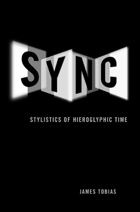
In Sync, James Tobias examines the development of musical sound and image in cinema and media art, indicating how these elements define the nature and experience of reception. Placing musicality at the center of understanding streaming media, Tobias presents six interwoven stories about synchronized audiovisual media—from filmmaker Sergei Eisenstein’s Alexander Nevsky to today’s contemporary digital art and computer games—to show how these effects are never merely "musical" in the literal sense of organized sound.
READERS
Browse our collection.
PUBLISHERS
See BiblioVault's publisher services.
STUDENT SERVICES
Files for college accessibility offices.
UChicago Accessibility Resources
home | accessibility | search | about | contact us
BiblioVault ® 2001 - 2024
The University of Chicago Press








